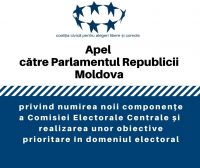APPEAL to the Parliament of the Republic of Moldova for appointing the new membership of the Central Electoral Commission and pursuing some priority electoral objectives
Considering that the mandate of Central Electoral Commission (CEC) expired on 16 June 2021, being extended for a maximum of 90 days until the new CEC membership is appointed according to Article 17(6) of the Electoral Code;
Reiterating suspicions of political influence over CEC, as underlined in the statement issued by the Civic Coalition for Free and Fair Elections with regards to the early Parliamentary Election of 11 July 2021;
Ascertaining that the mechanism for CEC establishment is a key element of the electoral legal system and should be reviewed via extensive public consultations;
Stating that, as per Article 16 of the Electoral Code, the Central Electoral Commission shall consist of 9 members: one member being appointed by the President of the Republic of Moldova, and the other 8 members — by the Parliament, complying with the proportional representation of the majority and the opposition.
Mentioning that the nominal membership of the Commission shall be confirmed by a Parliament Decision with the vote of the majority of elected Members of Parliament.

Member organisations of the Civic Coalition for Free and Fair Elections urge the Parliament of the Republic of Moldova:
- to appoint new members of the Central Electoral Commission within the legal term on the basis of their professionalism, integrity and meritocracy rather than their political loyalty;
- to organise a public process of appointing new CEC members;
- to ensure gender balance in the new CEC membership.
With regards to amending the Electoral Code, the Civic Coalition for Free and Fair Elections supports the need to amend the mechanism of Central Electoral Commission establishment in order to strengthen its independence and resilience to political interference, as well as the need to make the mandate of CEC member permanent.
Besides, the Coalition urges the Parliament to amend the electoral and related law in line with the recommendations of the Constitutional Court, findings, and recommendations of national and international election observation missions, as well as with the international electoral standards of OSCE, Venice Commission, Council of Europe etc.
Thus, the Parliament should prioritize the following:
- Supplement the electoral law with comprehensive and explicit regulations, including with regards to sanctioning such phenomena as:
- misuse of administrative resources;
- unlawful organised transportation of voters on the Election day;
- use of hate speech and incitement to discrimination;
- use of religious cults’ image during the electoral campaign;
- Implement alternative voting mechanisms;
- Improve the oversight and control mechanism for the funding of political parties and electoral campaigns, by removing the inconsistencies, clarifying the competencies and strengthening the capacity of the Central Electoral Commission;
- Review the legal norms on funding of political parties and electoral campaigns in order to ensure transparency in this area;
- Regulate more explicitly the mechanism of appealing the acts/omissions of electoral bodies and contenders, both during the electoral period and on the Election day;
- Improve the legal framework (Electoral Code, Code of Audiovisual Media Services) on media coverage of elections in order to eliminate the practice of spreading false and manipulative information and political partisanship in media;
- Regulate in a detailed and express manner the duties and responsibilities of the Broadcasting Council during the electoral campaign;
- Introduce regulations to clearly delimit the electoral/political advertising from commercial advertising;
- Review the law on using the image of international organisations and public institutions, both national and international (Article 52(8) of the Electoral Code);
- Enhance the electoral inclusion.
